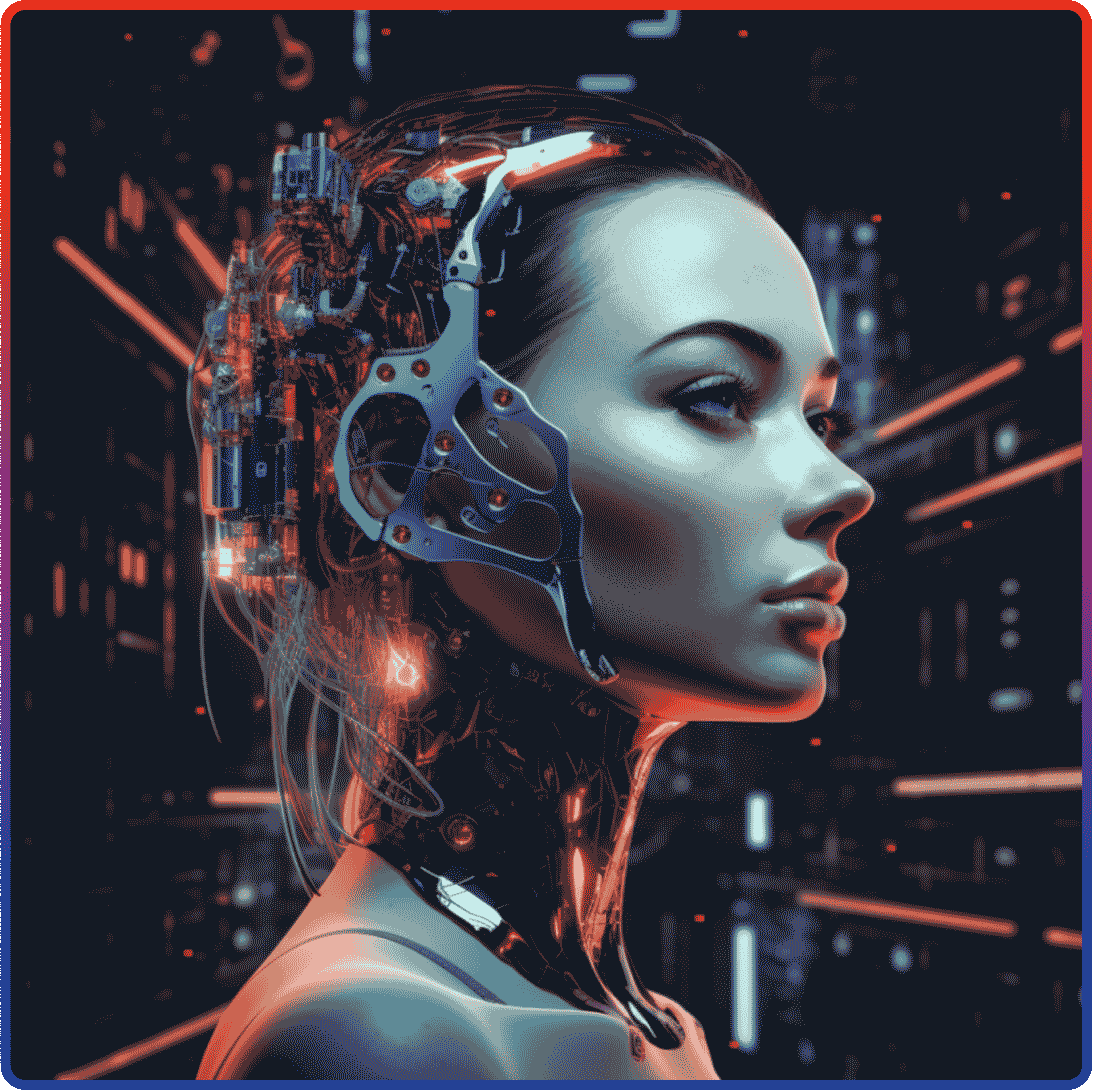
We are in the midst of 2024, and the transformative impact of AI-driven marketing is clear. It has revolutionized the marketing industry, enabling the transition from broad, generic strategies to personalized content, dynamic and efficient campaigns. Artificial Intelligence (AI) has become an integral part of the future of marketing, reshaping its core through AI-powered predictive analytics, hyper-segmentation, real-time content recommendations, and AI image generation.
The impact of AI on marketing this year has been nothing short of phenomenal. It has completely redefined audience segmentation, enabling marketers to create highly tailored messages that actually resonate with individual consumers. In addition, AI’s ability to accurately predict future trends and consumer behavior has enabled marketers to engage in strategic, proactive planning like never before.
The current buzz in AI marketing trends is all about visual content. AI image generation is the new frontier, enabling marketers to create engaging, personalized visual AI-generated content at scale. This advancement enhances storytelling capabilities and provides significant cost and time savings.
There is a clear growth trend in the AI market size for 2024. As AI continues to revolutionize various sectors, including marketing processes, its value is experiencing a remarkable rise. Companies have recognized the enormous potential of AI and are actively exploiting it. As a result, the AI market is larger and more influential than ever this year, driving unprecedented innovation and growth in marketing goals.
1. Predictive Analytics and Forecasting
The role of predictive analytics has been reimagined with AI. Today, businesses of all sizes can move beyond the simplicity of regression models and employ AI’s superior computing power and data accessibility to predict future outcomes with greater accuracy. Whether it’s forecasting the entire customer journey within the sales funnel, anticipating future product preferences, or identifying potential customers, AI makes accurate prediction possible. This advancement is enabled by Identification Models and Predictive Scoring that harness AI’s superior pattern recognition and statistical analysis capabilities.
Use Case: A retail company leverages AI to decipher past customer behavior patterns, enabling them to predict future purchasing trends accurately. This predictive power allows them to strategically plan inventory and sales strategies, thereby reducing wastage and boosting profitability.
2. Audience Hyper-Segmentation
AI can create highly focused customer segments based on intricate connections by sifting through massive data sets. This depth enables digital marketers to devise and deliver future campaigns that resonate more powerfully with target audiences.
Use Case: A digital marketing agency capitalizes on AI’s power to segment its client’s audience based on high-quality data, such as browsing habits, past purchases, and demographic information. The result is hyper-customized marketing campaigns that yield significantly higher returns on investment.

3. Persona Research and Psychographics
Building AI breathes new life into the process of building customer personas. Instead of relying on traditional static representations, marketers can use AI to create dynamic, real-time personas. These detailed avatars effectively mirror the customer base, providing priceless insights that can shape future marketing strategies.
Use Case: A Software as a Service (SaaS) company employs AI-powered tools to build intricate personas of their ideal customers. By understanding their customer’s needs and preferences in granular detail, they can tailor their product offerings and marketing messages more effectively.
4. Dynamic Personalized Ad Serving
AI’s capability to understand insights into customer behavior in real-time has transformed ad serving. This marketing technology enables platforms to deliver highly personalized ads at an unprecedented scale. Companies like Facebook and Google have led the pack, optimizing ad delivery based on user behavior and preferences.
Use Case: An e-commerce venture uses AI-powered solutions to serve dynamic ads to its individual customers, considering factors such as their browsing history, product views, and past purchases. This level of customization improves click-through rates and conversions, driving growth and profitability.
5. Content Recommendations
AI-powered content recommendations have become a vital tool for maintaining customer engagement. By predicting what type of content users are likely to interact with and serving it to them in real time, companies can keep users engrossed for extended periods. Netflix and YouTube have demonstrated the power of this approach, fostering continuous engagement on their social platforms.
Use Case: A streaming platform uses AI to curate and recommend new movies and shows based on a user’s viewing history. This approach encourages users to spend more time on the platform, thereby improving customer satisfaction and retention.
6. Micro-moments & Targeted Timing
This allows marketers to predict peak engagement times by analyzing amounts of customer data. This capability enables them to time their future campaigns perfectly, maximizing the impact of their messages.
Use Case: A fitness app uses AI to predict when users are most likely to work out and delivers motivational messages and workout recommendations at those exact moments. This personalized approach boosts user engagement and commitment, leading to better customer retention.

7. Lead Qualification and Scoring of AI-powered campaigns
Streamline the lead qualification and scoring process by delivering the right message to the right person at the right time, all at scale. This targeted approach helps companies use their resources more effectively, resulting in higher conversion rates.
Use Case: A B2B enterprise uses AI to score and qualify leads based on their interaction with the company’s digital content. This process helps the sales team prioritize their efforts, focusing on the most promising leads and improving their conversion rates.
8. Email Marketing Dynamic Optimization
AI enhances email campaigns by optimizing hyper-segmentation and timing, leading to increased engagement rates and efficiency. With AI-powered platforms, companies can ensure their emails are sent at the most opportune times and tailored to each recipient, boosting open and conversion rates.
Use Case: A fashion retailer uses AI to send personalized email promotions to customers at times when they’re most likely to be online and receptive. This approach increases the likelihood of their emails being opened and acted upon, resulting in higher conversion rates.
9. Chatbots
Chatbots have evolved significantly, becoming capable of delivering automated, personalized responses. This capability allows them to provide users with 24/7 support, handle multiple inquiries simultaneously, and learn from past interactions to improve future responses.
Use Case: A tech support company uses an AI-powered chatbot to handle basic troubleshooting inquiries. This automation frees up human agents to tackle more complex issues, leading to improved customer service and efficiency.

10. Visual Search
Visual search lets users find products online using real-world images, providing a seamless and efficient shopping customer experience. This feature is especially useful in the eCommerce space, particularly for industries like fashion and home decor.
Use Case: A furniture retailer integrates an AI-powered visual search feature on its website. Customers can upload photos of desired furniture pieces, and the AI matches these images with similar items from the online retailer’s catalog, streamlining the shopping experience.
11. Dynamic Pricing
AI has revolutionized pricing strategies by enabling instant adjustments based on fluctuating market variables. This capability helps optimize profit and inventory efficiency, leading to improved business performance.
Use Case: An airline uses AI-powered dynamic pricing to adjust flight prices based on factors like seat availability, booking consumer demand, and time of purchase. This approach maximizes revenue and improves yield management.
12. Voice Search
AI-powered voice assistants are becoming an essential part of many households. Brands are beginning to integrate this technology into their digital marketing strategy, offering consumers additional value and keeping their brands at the forefront.
Use Case: A smart home device manufacturer develops an Alexa app that not only controls their products but also provides useful content and product recommendations to users, enhancing the user experience and promoting brand loyalty.

13. AI Image generation
AI image generation, driven by Generative Adversarial Networks (GANs), is set to revolutionize marketing in 2024. This innovative technology generates unique visuals cost-effectively, replacing expensive photo shoots or image searches. Notably, it enables personalization at scale, creating images tailored to specific audience segments based on their behaviors and preferences.
Use Case: A travel agency employs AI image generation to craft personalized visual content. The AI generates images of serene beaches and luxurious resorts for a user interested in tropical vacations. Conversely, for an adventure-loving user, it creates images of hiking trails or mountain vistas. This technology thus boosts user engagement and conversions.
As we navigate the marketing landscape in 2024, the impact of AI is palpable. It has irrevocably reshaped our strategies, powering a shift from generic advertising campaigns to hyper-personalized, efficient approaches that resonate deeply with audiences.
Predictive analytics, hyper-segmentation, real-time persona creation, and personalized ad serving are no longer buzzwords but everyday marketing tools that have revolutionized our industry. Lead qualification, email marketing, and customer support have become seamless, amplifying efficiency and engagement.
The most exciting development this year has been AI image generation. This trend, still in its nascency, is set to transform visual content creation by infusing it with a level of personalized experiences previously unimaginable.
In the heart of 2024, we are witnessing AI-based tools not just altering the course of marketing but shaping its future, carving out a path of innovation and limitless possibilities.





